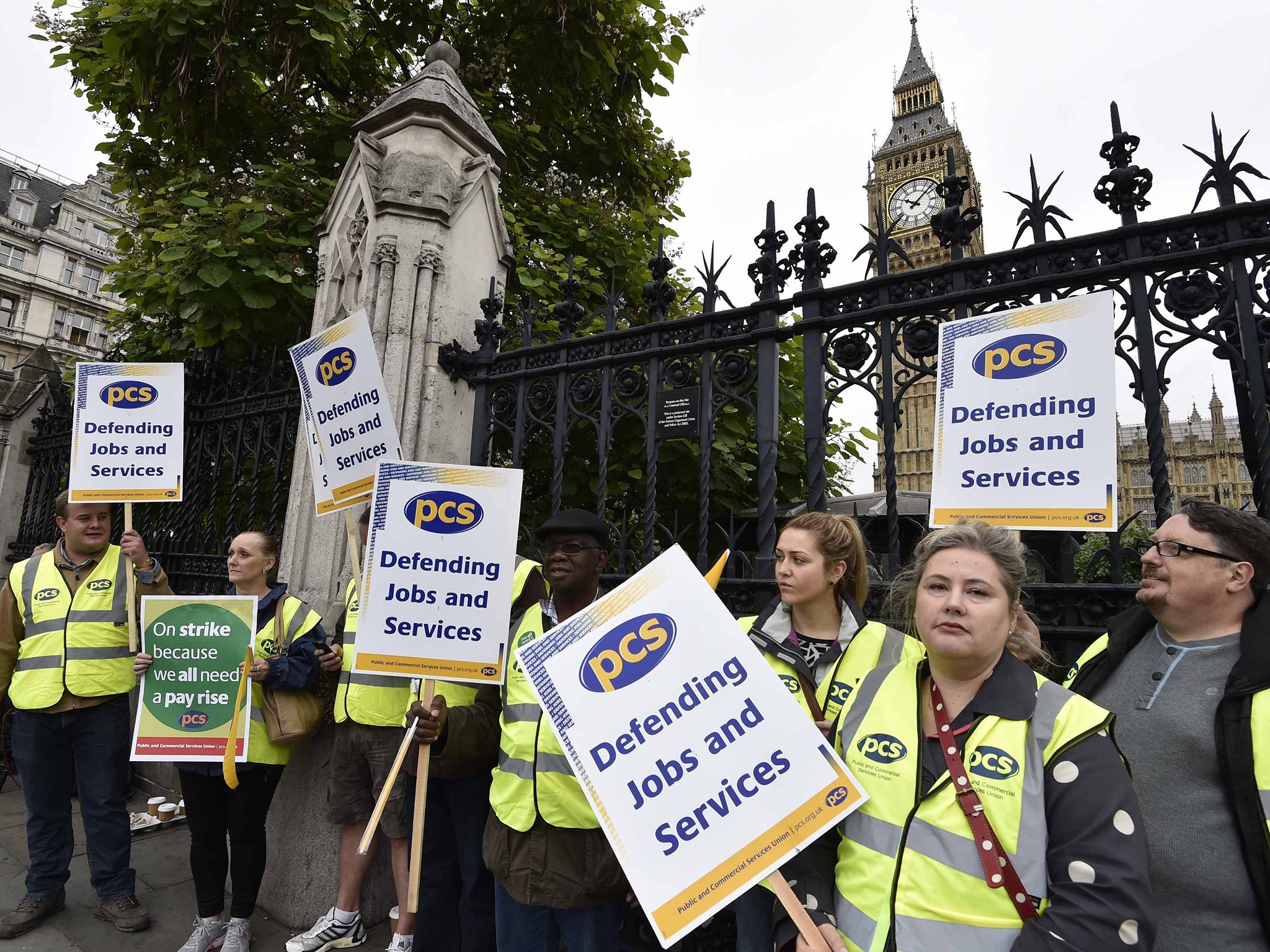Civil Service strikes: Who are they and why are they striking?
Picket lines will be erected outside of Government offices, museums and courts as servants take strike action

Jobcentre staff will be joined by staff from the UK’s courts, museums, driving test centres, ports and airports on Wednesday as thousands of members of the civil service go on strike over pay.
Picket lines are expected to be set up outside of Government offices, museums, galleries, courts and other buildings as up to 200,000 Public and Commercial Services union (PCS) members could take strike action.
The 24-hour strike is the result of a long-running dispute over job cuts, pay freezes, and increased contribution to pensions since the Coalition came into power, which the PCS union claims will have caused a 20 per cent cut in income by next year when factors such as inflation on essential bills, fuel and food are taken into account.
The spokesperson for the Cabinet Office said there is a "strong indication" that only 72,000 civil servants are on strike, but official figures will not be confirmed until later on Wednesday.
NHS staff strike: Midwives and nurses stage four-hour walk out
Show all 17The strike comes just days after 400,000 NHS staff staged a four hour strike on Monday, the biggest in over 30 years, over pay. The strike included midwives, who decided to strike for the first time in their union’s 133 year history.
In 2010, a two-year pay freeze was introduced across public sector jobs, which was followed by a one per cent cap on pay rises. The PCS has estimated that on average, its union members have seen their pay fall in value by around £2,300 over the past four years.
Despite the tens of thousands of civil service jobs that have been cut over the past few years, the Government claims the restraints on workers’ pay has helped to keep more public sector workers in jobs.
The PCS union claims that a new report by the New Economics Foundation shows the real effect of the pay cuts however, stating that the poorest 10 per cent of Britons had seen a 15 per cent decline in their incomes over the past year.
Mark Serwotka, PCS general secretary, said the figures “prove what people in low paid households already know, that the real cost of living is soaring while wages are being cut year after year”.
“Our action this week demands an end to these cuts that are slashing the public servants’ living standards at the same time as millionaires are handed tax cuts and tens of billions of pounds is stolen from our public finances every year through tax evasion,” he added.
"It is completely unacceptable that people's pay has fallen since the coalition came to power in 2010. That is why this battle is so significant.
"We believe the strike will be well supported because of the dreadful pay situation and the appalling treatment of civil service workers, with offices being closed, jobs lost, the threat of privatisation and clamping down on sick pay,” Mr Serwotka said.
Today’s action will be followed by a demonstration on Saturday, in which hundreds of thousands of TUC union members will march in London under the slogan “Britain needs a pay rise”.
The Cabinet Office has hit back at PCS, stating that the “irresponsible leadership” of the union has “a weak and outdated mandate for today’s strikes,” adding that the union “didn’t even manage to persuade a fifth of their members to back action”.
The spokesperson added: "Worse still, their ballot was conducted 18 months ago. It cannot be right for the union leadership to threaten to disrupt the lives of hardworking people when the overwhelming majority of dedicated public servants did not support these strikes.
"As part of our long-term economic plan, this Government is taking tough decisions to address the budget deficit we inherited after the 2010 general election. One was to introduce pay restraint in the public sector, while protecting the lowest paid. Pay restraint protects public sector jobs, supports high-quality public services and helps keep the UK's finances back on track."
Additional reporting by PA
Subscribe to Independent Premium to bookmark this article
Want to bookmark your favourite articles and stories to read or reference later? Start your Independent Premium subscription today.

Join our commenting forum
Join thought-provoking conversations, follow other Independent readers and see their replies